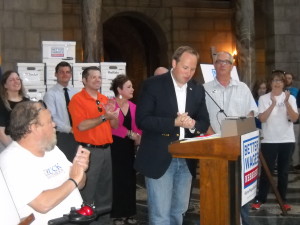Takin’ it to the streets: Dems may take other issues to Nebraska ballot box

By Deena Winter | Nebraska Watchdog
LINCOLN, Neb. — Fresh off a rousing success getting Nebraska voters to approve a minimum wage hike, Democratic leaders may take other issues to the ballot box, too.
TAKE IT TO THE PEOPLE: Omaha Sen. Jeremy Nordquist thanks supporters for gathering 135,000 signatures in seven weeks.
Medicaid expansion, for example, has been a hot potato in the Legislature for the past two years. A bill to expand the program — a key provision in Obamacare designed to cover low-income people — likely would have had enough votes to pass, but didn’t have the super-majority required to beat a filibuster.
With Republicans picking up even more seats in the Legislature Tuesday, Democrats may have better luck with the ballot box than the Capitol.
“I certainly think that’s a possibility for the future,” said Sen. Jeremy Nordquist, D-Omaha, a leader of the group that promoted passage of the wage hike. “Obviously this has enthused the individuals who supported it financially and volunteered to support the effort.”
No discussions of other ballot measures have happened yet, he said, but polling on another issue — requiring businesses to provide paid sick leave — also found 56 percent support in Nebraska, slightly less than the 60 percent support they found for a wage hike. Ultimately, the minimum wage measure passed by 59 percent.
Michael Saltsman, research director at the Employment Policies Institute, which opposes mandated minimum wage increases, thinks the wage increase passed in four conservative states because there was little to no organized opposition in all but South Dakota, which had the slimmest margin of victory.
Nebraskans for Better Wages raised about $1.4 million to promote the ballot measure, while no ballot committee registered to oppose it. Its passage in all four states should be “a lesson to local business groups that if you don’t fight these things, you can’t win,” he said.
Some feared the ballot measure would be a wedge issue that could take down politicians who opposed it, but the election results proved it wasn’t a political kiss of death, he said.
He thinks Democrats pushed the issue to try to get out voters who would be more inclined to support their people.
“The wedge issue was sort of a strategic flop,” he said.
However, the ballot measure is believed to have played a role in the stunning ouster of a 16-year Republican congressman in Omaha. Nordquist’s group really pushed its supporters to vote absentee, and Democratic challenger Brad Ashford won nearly twice as many of those early votes as the incumbent, Lee Terry. Those absentee votes were more than enough to account for Ashford’s lead.
Nordquist acknowledges the early voters tended to go with Ashford, but said there were many other factors in the race.
“Success always has a thousand fathers,” Nordquist said. “You can point to anything in a close race like that.”
Republicans dominated elsewhere in Nebraska, as they did nationally. Why did Nebraskans vote for the wage bump and for Republicans, who generally opposed it?
Nordquist said Nebraskans looked at all issues, not just one, and understood the need for low-income, full-time workers to earn enough to make ends meet.
Nebraska will have the highest “real minimum wage” in the nation when it climbs to $9 in 2016, or $9.99 when adjusted for the cost of living, according to Bloomberg.
Nordquist sponsored a wage hike bill that failed in the Legislature, and said, “We’ll continue to give it our best shot in the Legislature” on other issues, such as Medicaid expansion.
If that doesn’t work, he said, “I think it is a possibility in the future if the Legislature and our governor-elect choose not to act on some of these issues that working families need, there’s potential for future petition drives.”
Follow Deena on Twitter at @DeenaNEWatchdog
Editor’s note: to subscribe to News Updates from Nebraska Watchdog at no cost, click here.







